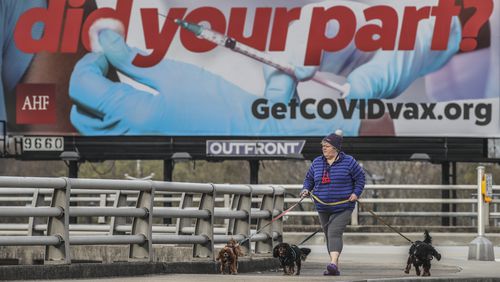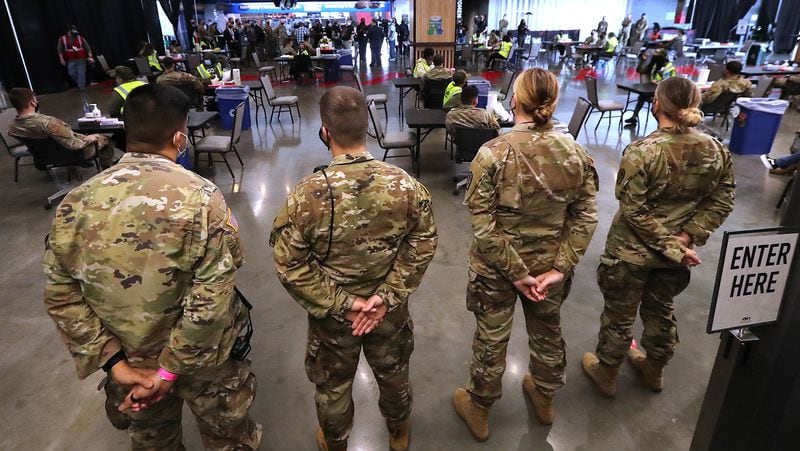Gov. Brian Kemp outlined a plan Wednesday to start rolling back many of Georgia’s remaining coronavirus restrictions next week, even as President Joe Biden and health experts warn of a potential fourth surge of the pandemic if people let down their guard.
The governor signed an executive order that as of April 8 ends a ban on large gatherings, eliminates shelter-in-place requirements for vulnerable populations, and pares down a lengthy list of safety guidelines that businesses such as bars, retail stores and entertainment venues are supposed to follow.
Kemp issued a separate order Wednesday that could end Georgia’s state of emergency on April 30, a year after it started. But Kemp could decide to extend that declaration, as he has done repeatedly over the past year.
The governor has said loosening the rules is a crucial step to returning to “normal life” as the number of new infections in the state has declined from the winter peak and millions of Georgians secure at least one dose of vaccine.
But the timing comes amid sharpening concerns that new, more worrisome variants of the disease could take hold despite a growing inoculation campaign. Dr. Rochelle Walensky, head of the Centers for Disease Control and Prevention, spoke of “impending doom” if Americans don’t remain vigilant.
Biden, too, issued an appeal this week to governors to reinstate mask mandates and other restrictions, calling a potential fourth surge a “deadly serious” threat.
Credit: Curtis Compton / Curtis.Compton@ajc.com
Credit: Curtis Compton / Curtis.Compton@ajc.com
However, Kemp said Wednesday he worried businesses couldn’t survive an extension of economic limits. His order will allow restaurants to greatly expand capacity, by reducing spacing requirements between indoor tables. It also relaxes spacing rules in gyms and fitness centers and removes the 50-attendee cap on in-person gatherings. However, many hygiene rules will remain in place. Servers and restaurant staff, for example, will still have to wear masks when interacting with customers.
Georgia would join more than a dozen other states that have eased restrictions implemented a year ago to curb the spread of COVID-19. Among them are Mississippi and Texas, where officials lifted mask mandates and allowed businesses to operate at full capacity.
Georgia was among the last states to close and the first to reopen from lockdown at the start of the pandemic. Kemp began lifting restrictions last April. By June, he allowed bars, nightclubs and summer camps to re-open and in-person dining to resume, within certain guidelines. On July 1, he enabled live entertainment venues to open. But in August, as Georgia was reporting the highest rate of new cases in the nation, the governor ordered all residents and visitors to practice social distancing and businesses and governments to limit gatherings to no more than 50 people.
Unlike many other states, Georgia never adopted a statewide mask mandate, though in August he also permitted some local governments to require face coverings.
In recent months, Kemp made few substantive changes to the ongoing emergency orders. However, an Atlanta Journal-Constitution review found the rules are very rarely enforced.
And his new executive order also eliminates the ability of law enforcement to close an organization for failure to comply with the rules.
Credit: Curtis Compton / Curtis.Compton@ajc.com
Credit: Curtis Compton / Curtis.Compton@ajc.com
Challenges ahead
Kemp’s planned loosening comes amid good news on the vaccine front as millions nationally get their shots, including many of the most vulnerable populations.
The governor last week allowed all Georgia adults to begin receiving the vaccines, a dramatic expansion of eligibility. More than 3.6 million doses of the vaccines have now been administered in the state.
However, Georgia still faces challenges distributing the lifesaving doses, and national trends also suggest a fourth wave of COVID-19 cases is taking hold in parts of the U.S.
That fourth wave is led by a strain of the virus first discovered in the United Kingdom that is more infectious and deadly.
Nationally, the daily average of new infections is again greater than 60,000. Cases, hospitalizations and deaths are each on the rise in Michigan, a state that has done a better job of vaccinating its population than Georgia.
Georgia Department of Public Health data show a vast improvement since the January peak of cases and deaths. But, the seven-day rolling average of new confirmed and suspected cases has plateaued since March 14. So has the number of people currently hospitalized in Georgia with COVID-19, though hospitals here continue to see a high rate of new COVID-19 patients compared to the rest of the nation, ranking third worst behind Michigan and New Jersey.
The key to avoid a devastating fourth surge, public health experts said, is to maintain masking and social distancing to buy time — perhaps just a matter of several weeks — to vaccinate more of the public.
“We know the variant is present in Georgia, and we’re only capturing the tip of the iceberg,” said Amber Schmidtke, a public health researcher and former Mercer University professor who tracks Georgia’s epidemic on her widely read newsletter and blog. “I think Georgia is more lucky than good in that we’re not seeing a surge yet. But we have seen cases flatten out.”
Schmidtke said rolling back restrictions now, however, sends the message that the pandemic is over. “I think the state would be better served by waiting three to four weeks to get more vaccines in arms,” she said.
Dr. Cecil Bennett, medical director of a primary care center in Newnan and an adjunct professor at Morehouse School of Medicine’s Family Medicine Program, said he sees two possible scenarios with the governor’s easing of restrictions:
“First one, we have people on the beach on a bright sunny day and a Category 5 hurricane is coming but it doesn’t matter to them today,” he said. An increase in the spread of variants, combined with low mask wearing, relaxed attitudes about group gatherings and a significant number of people in Georgia who won’t get vaccinated create Category 5 conditions, he said.
When you add those elements together, “what the governor is proposing can only lead to disaster in the next few weeks.”
But, he said, there’s another possibility, “where opening the state may not be as bad it seems.”
With many people over age 50 at the greatest risk for severe illness and hospitalization having been vaccinated, the total number of coronavirus cases may rise but it may not lead to a jump in complications and hospitalizations.
“It’s an executive decision the governor has to make,” he said. “So, I am glad I am not the governor.”
Even so, Bennett said he would err on the side of caution and wait at least four weeks to see if another surge comes and what the effects may be before easing restrictions.
Dr. Harry J. Heiman, a clinical associate professor at the Georgia State University School of Public Health, also sees the move as premature.
“Our restrictions and policies weren’t very robust in the first place,” he said. “But it’s clearly not the time to be thinking about rolling back restrictions. We’re finally at a time when we’re seeing a light at the end of the tunnel, and that light is either going to be turning the corner on this pandemic or a train of variants and a surge.”
Others, though, have cited the economic toll the pandemic has taken and said the state must move to spur recovery.
In the past year, the state Department of Labor has processed more than 4.5 million unemployment claims, paying benefits to well over a million people.
Although the official jobless rate has dropped dramatically, about 450,000 Georgians are still receiving either state or federal unemployment benefits.
And the lion’s share of losses have been to lower-income workers.
Staff writers Michael E. Kanell contributed to this article.











